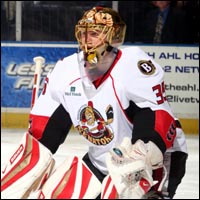by Lindsay Kramer || NHL.com
 Binghamton Senators goalie Jeff Glass can be excused for feeling like he had to do it all the past couple of seasons.
Binghamton Senators goalie Jeff Glass can be excused for feeling like he had to do it all the past couple of seasons.
There was, indeed, so much to do.
Restore a reputation polished to the hilt in junior hockey. Help compensate for a bad defense in front of him. Claw his way through a system brimming with talent at his position.
It all taxed every fiber of the third-year pro’s 6-foot-3, 203-pound body.
“I thought I had to do more than I could,” said Glass, 22. “When you are in those positions, sometimes you feel you have to do more than you can.”
For any young player, that philosophy is an express lane to trouble. For a goalie, it’s just begging for disaster. Fortunately for Glass though, he cut that problem off in time to become one of the biggest turnaround projects in the first half of the AHL season.
Glass has taken over as the stopper on the Senators with a 2.40 goals-against average and a .923 save percentage. Those numbers peg him as one of the better goalies in the league. Last season’s totals made him perhaps the most ineffective of any starter — 9-24-2, 4.11, .888.
Sure, Glass stood behind a horrible defense — the Senators’ 323 goals allowed were by far the most in the AHL. But Glass, through what seemed like good intentions at the time, did his part to toss kerosene onto that bonfire by pressing to be everywhere all at once.
“If I try to move around too much. I create holes. It’s more of a timing thing,” Glass said. “Just be confident. The pucks will hit you if you’re in the right position. It sounds easy. But it’s not.”
Oh, it used to be. Or at least Glass was good enough to make it look that way. In 2004-05, his last season with Kootenay of the WHL, he was named the Canadian Hockey League’s goalie of the year by going 34-11-5 with a 1.76 GAA and a .932 save percentage. He also helped Canada win its first World Juniors gold in seven years, posting a 5-0-0 record with a 1.40 goals-against.
 That was the form that spurred Ottawa to take him in the third round of the 2004 draft. But the adjustment to pro life was immediately harsh. Glass spent almost all of his rookie season with Charlotte of the ECHL, and got just six games in Binghamton (1-4, 3.85, .883).
That was the form that spurred Ottawa to take him in the third round of the 2004 draft. But the adjustment to pro life was immediately harsh. Glass spent almost all of his rookie season with Charlotte of the ECHL, and got just six games in Binghamton (1-4, 3.85, .883).
“I stepped in and assumed I had to steal every game,” Glass admitted. “You don’t have to re-invent the wheel to get to the next level. It’s a team sport. You have to rely on everyone else.”
Glass’ epiphany came in stages. A large one unfolded last summer while working with Ottawa goaltending coach Eli Wilson. Glass, a butterfly goalie, can obviously eat up space when he’s technically sound. But Wilson pointed out that by scrambling around and becoming a hybrid goalie, he was creating a lot of holes. In effect, he was making himself smaller.
“He’s got the athletic ability and the talent,” Wilson said. “He was trying so hard to make every save like it was the last save. He was ahead of himself right off the start on a lot of the plays last year. That’s not the way you want to approach it. The easier you make the first save, the easier the second save is, and the third save.”
Glass got a huge boost to his support system when Cory Clouston took over as Binghamton’s coach this season. Clouston was coach of Kootenay when Glass was there, and knew of him as nothing but a great goalie.
“We didn’t even talk about last year. Right off the bat we talked about how we could improve this year. It was almost like we turned over a new sheet of paper,” Glass said.
“I couldn’t put a finger on what he was doing (wrong). Goaltenders are an easy target when a team struggles,” Clouston said. “When you are facing top scoring chances every night, it’s tough to go into that game. This year, he doesn’t have that much pressure on him as far as he has to win us games.”
A big part of that stems from the Senators’ improved cast of defensemen. Glass spreads the credit and appreciates the help, but perhaps the key factor in his improvement came from an inner jolt.
“I guess if there had to be a turning point, I think maybe it was this summer,” he said. “I realized this is my year. This is my year to put up or shut up. You want to be a goalie that performs under pressure. You look around, you see your peers. You ask yourself, what kind of position you see yourself in, three, four, five years from now.”
The immediate impulse is to answer, between the pipes of course. The issue of where that might be isn’t as clear-cut. Glass is in the final season of his contract. He’s sharing time in Binghamton with rookie Brian Elliott, a hotshot out of Wisconsin. Ahead of them, Ray Emery’s shadow is all anyone can see in Ottawa.
Glass would love to keep paying off his delayed dividends in the organization. That’s an issue partly out of his control, however. Over-reaching for challenges is what mucked him up in the first place. He’s not about to make that same mistake again.
“I don’t know if that’s up to me to decide. However the chips fall, they fall,” Glass said. “I try not to think past the next game. It’s easy to look into the future and get caught up in where you want to be, and where you’re not. You’re getting impatient. It’s been going well, but I still think I have room to improve. We’ll go from there.”
Lindsay Kramer, the AHL correspondent for NHL.com, profiles an up-and-coming player each Monday and his AHL notebook appears each Thursday on NHL.com.

































